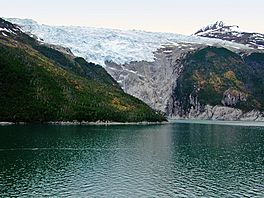Romanche Glacier facts for kids
Quick facts for kids Romanche Glacier |
|
|---|---|
 |
|
| Location | Chile |
| Coordinates | 54°52′S 69°28′W / 54.867°S 69.467°W |
The Romanche Glacier is a large, slow-moving river of ice located in Chile. It is found within the beautiful Alberto de Agostini National Park. A special feature of this glacier is a stunning waterfall that flows directly from the ice into the Beagle Channel.
Contents
What is a Glacier?
A glacier is a huge mass of ice that moves very slowly over land. Glaciers form in places where more snow falls in winter than melts in summer. Over many years, layers of snow pile up and get compressed. This pressure turns the snow into dense ice.
How Glaciers Move
Glaciers are not frozen still; they actually flow like very slow rivers. Their own weight makes them slide downhill. This movement can carve out valleys and shape the landscape over thousands of years. Glaciers are powerful forces of nature.
Where is the Romanche Glacier Located?
The Romanche Glacier is situated in the southern part of Chile, a country in South America. It is part of the vast Alberto de Agostini National Park. This park is known for its stunning fjords, mountains, and many glaciers.
The Beagle Channel
The glacier's ice melts and forms a cascade that tumbles into the Beagle Channel. The Beagle Channel is a famous waterway in the far south of South America. It separates islands like Isla Grande de Tierra del Fuego from smaller islands to the south. This channel is a popular spot for exploring the region's natural beauty.
Features of Romanche Glacier
One of the most striking features of the Romanche Glacier is its cascade. This is like a waterfall, but instead of water from a river, it's meltwater from the glacier itself. This water flows directly into the Beagle Channel, creating a dramatic sight for visitors.
Glaciers and Climate Change
Glaciers like Romanche are important indicators of Earth's climate. Scientists study them to understand how our planet's temperature is changing. Many glaciers around the world are shrinking due to rising global temperatures. Protecting these icy giants is important for the environment.
See also
 In Spanish: Glaciar Romanche para niños
In Spanish: Glaciar Romanche para niños
 | Janet Taylor Pickett |
 | Synthia Saint James |
 | Howardena Pindell |
 | Faith Ringgold |

